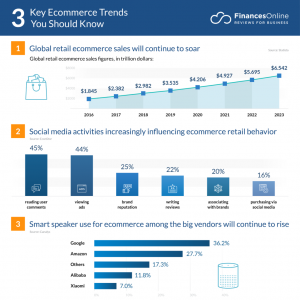
Emerging Trends Shaping E-commerce Landscape
The world of e-commerce is dynamic, with trends continually evolving to meet the changing demands of consumers and advancements in technology. Understanding and adapting to these trends are essential for businesses looking to stay competitive in the fast-paced digital marketplace.
1. Rise of Social Commerce:
Social commerce has gained significant traction, blurring the lines between social media platforms and online shopping. Businesses are leveraging platforms like Instagram and Facebook to showcase products, facilitate seamless transactions, and tap into the power of social recommendations. The integration of shopping features directly into social media channels is reshaping the e-commerce landscape.
2. Personalization and AI:
The era of one-size-fits-all is long gone. E-commerce platforms are increasingly utilizing artificial intelligence (AI) to analyze customer behavior and preferences. This data is then used to offer personalized shopping experiences, from product recommendations to tailored marketing messages. As AI continues to advance, the level of personalization in e-commerce is expected to reach new heights.
3. Contactless and Seamless Checkout:
With the growing emphasis on convenience, contactless and seamless checkout experiences are becoming standard. Innovations such as digital wallets, one-click payments, and biometric authentication are streamlining the checkout process, reducing friction for customers and enhancing overall satisfaction.
4. Augmented Reality (AR) in Shopping:
AR is transforming the way consumers shop online by providing immersive and interactive experiences. From virtual try-ons for clothing and accessories to visualizing furniture in one’s home, AR is enhancing the online shopping experience. Businesses adopting AR technologies are likely to stand out in a crowded digital marketplace.
5. Sustainability and Ethical Shopping:
E-commerce trends increasingly reflect consumer concerns about sustainability and ethical practices. Eco-friendly packaging, transparent supply chains, and product sourcing from ethical suppliers are becoming key considerations for online shoppers. Businesses that prioritize sustainability not only contribute to a better world but also appeal to a growing segment of environmentally conscious consumers.
6. Voice Commerce:
Voice-activated virtual assistants are changing how consumers interact with e-commerce platforms. The convenience of voice search and commands is reshaping the shopping journey, prompting businesses to optimize their websites for voice and explore voice-activated shopping experiences. As voice recognition technology improves, this trend is expected to gain more prominence.
7. Subscription E-commerce:
The subscription model continues to thrive in e-commerce. From subscription boxes to regular replenishment services, consumers appreciate the convenience and personalization offered by subscription-based shopping. E-commerce businesses are capitalizing on this trend by offering curated subscription services for various products, fostering customer loyalty and recurring revenue.
8. Mobile Commerce Dominance:
The dominance of mobile devices in our daily lives is reflected in the e-commerce landscape. Mobile commerce, or m-commerce, is on the rise, with consumers increasingly using smartphones and tablets for online shopping. E-commerce platforms that prioritize mobile optimization and provide seamless mobile experiences are well-positioned to capture this growing market.
9. Real-Time Customer Support:
Customer support is a crucial aspect of e-commerce, and real-time support is gaining prominence. Chatbots, virtual assistants, and instant messaging services are being employed to provide immediate assistance to customers. Quick and effective customer support not only resolves issues promptly but also contributes to a positive customer experience.
10. Blockchain for Security:
As concerns about online security persist, blockchain technology is gaining traction in the e-commerce sector. Blockchain provides a secure and transparent way to handle transactions and sensitive information, reducing the risk of fraud and ensuring data integrity. E-commerce platforms adopting blockchain contribute to building trust among online shoppers.
To learn more about E-commerce trends, visit businessinc.my.id. Explore insights and resources to keep your e-commerce business on the cutting edge of industry trends, ensuring sustained growth and customer satisfaction.



